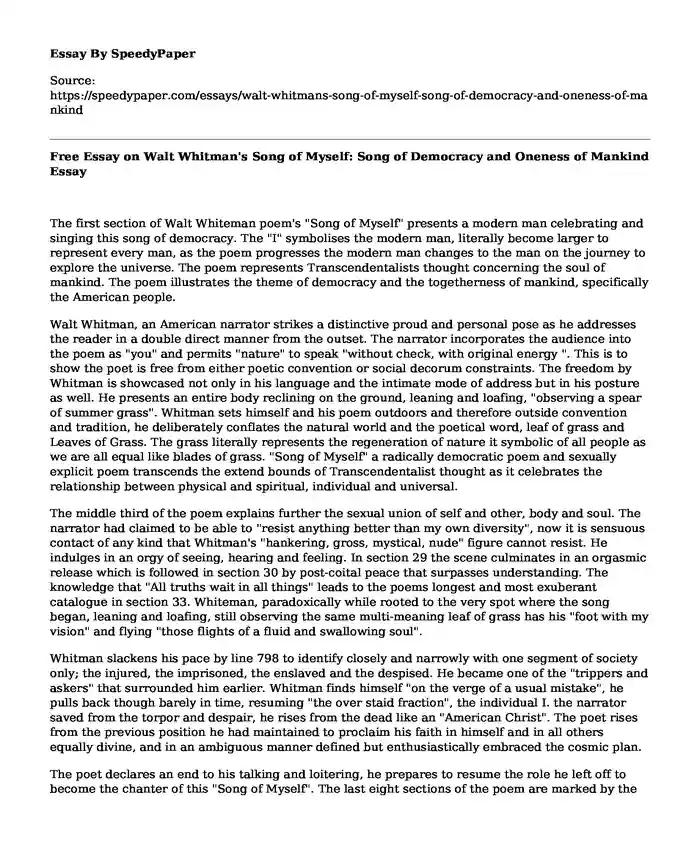
| Type of paper: | Essay |
| Categories: | Poem Walt Whitman |
| Pages: | 3 |
| Wordcount: | 792 words |
The first section of Walt Whiteman poem's "Song of Myself" presents a modern man celebrating and singing this song of democracy. The "I" symbolises the modern man, literally become larger to represent every man, as the poem progresses the modern man changes to the man on the journey to explore the universe. The poem represents Transcendentalists thought concerning the soul of mankind. The poem illustrates the theme of democracy and the togetherness of mankind, specifically the American people.
Walt Whitman, an American narrator strikes a distinctive proud and personal pose as he addresses the reader in a double direct manner from the outset. The narrator incorporates the audience into the poem as "you" and permits "nature" to speak "without check, with original energy ". This is to show the poet is free from either poetic convention or social decorum constraints. The freedom by Whitman is showcased not only in his language and the intimate mode of address but in his posture as well. He presents an entire body reclining on the ground, leaning and loafing, "observing a spear of summer grass". Whitman sets himself and his poem outdoors and therefore outside convention and tradition, he deliberately conflates the natural world and the poetical word, leaf of grass and Leaves of Grass. The grass literally represents the regeneration of nature it symbolic of all people as we are all equal like blades of grass. "Song of Myself" a radically democratic poem and sexually explicit poem transcends the extend bounds of Transcendentalist thought as it celebrates the relationship between physical and spiritual, individual and universal.
The middle third of the poem explains further the sexual union of self and other, body and soul. The narrator had claimed to be able to "resist anything better than my own diversity", now it is sensuous contact of any kind that Whitman's "hankering, gross, mystical, nude" figure cannot resist. He indulges in an orgy of seeing, hearing and feeling. In section 29 the scene culminates in an orgasmic release which is followed in section 30 by post-coital peace that surpasses understanding. The knowledge that "All truths wait in all things" leads to the poems longest and most exuberant catalogue in section 33. Whiteman, paradoxically while rooted to the very spot where the song began, leaning and loafing, still observing the same multi-meaning leaf of grass has his "foot with my vision" and flying "those flights of a fluid and swallowing soul".
Whitman slackens his pace by line 798 to identify closely and narrowly with one segment of society only; the injured, the imprisoned, the enslaved and the despised. He became one of the "trippers and askers" that surrounded him earlier. Whitman finds himself "on the verge of a usual mistake", he pulls back though barely in time, resuming "the over staid fraction", the individual I. the narrator saved from the torpor and despair, he rises from the dead like an "American Christ". The poet rises from the previous position he had maintained to proclaim his faith in himself and in all others equally divine, and in an ambiguous manner defined but enthusiastically embraced the cosmic plan.
The poet declares an end to his talking and loitering, he prepares to resume the role he left off to become the chanter of this "Song of Myself". The last eight sections of the poem are marked by the urgency of departure; the narrator uses last-minute preparations, last words of advice and reluctance to leave at all till his audience speaks his or her own word in response. The audience in these sections is the poet's students and comrade, sister and brother. Whitman stands accused by the free-flying hawk, he reluctantly but also joyously sounds the last words of his "barbaric yawp" continuing his "perpetual tramp", not so much departing the scene as dispersing himself into the elements themselves.
In conclusion, Whitman divested himself of the "ornaments" and "fluency" of conventional verse in order to craft poetry more natively American, not only in subject but also in style. He looked to the present moment and projected future, unlike other poets who look back the American past. Whitman "omnivorous lines" give the illusion of leaving nothing out, of being democratically all-inclusive and a strange mixture. The merging of self and other in terms of sympathetic identification serves the poem's varied materials together in one organic, evolving whole. The narrator's self-generating performance shows the emphasis the poem places on I. The persona in the poem embodies the paradoxical process of becoming what he has always been and must be. The poet becomes his own transgressive self by freeing himself from all poetic and social constraints. An Emersonian representative man, a Transcendentalist version of the typically American tall-tale hero bragging for all mankind
Work Cited
Whitman, Walt. Song of myself. Courier Corporation, 2001.
Cite this page
Free Essay on Walt Whitman's Song of Myself: Song of Democracy and Oneness of Mankind. (2022, Feb 18). Retrieved from https://speedypaper.com/essays/walt-whitmans-song-of-myself-song-of-democracy-and-oneness-of-mankind
Request Removal
If you are the original author of this essay and no longer wish to have it published on the SpeedyPaper website, please click below to request its removal:
- Free Essay for Students: Health and Healthcare Disparities
- Subject of the Essay Sample: Issues Raised in IFRS's BCUCC Project
- Free Essay about the Role of the Executive in Arms Export Policy
- Essay Example on Relationship between Each Piece of Intelligence Legislation
- Article Analysis Essay on "Why Rural America Voted for Trump" by Robert Leonard
- Week 7 Assignment
- Paper Example - Communication and Technology
Popular categories




